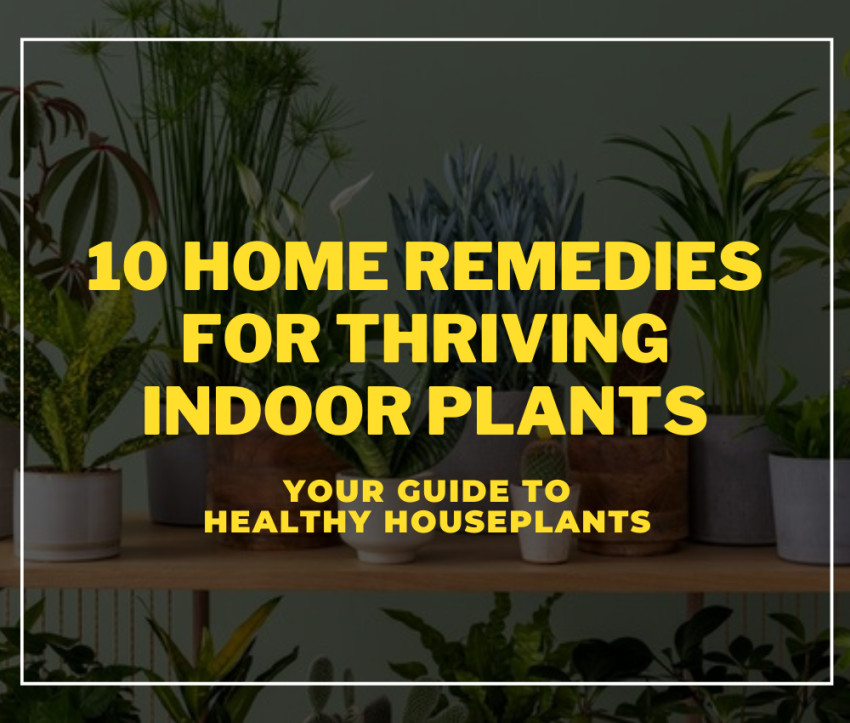
Introduction:
Indoor plants not only beautify our living spaces but also contribute to cleaner air and a healthier environment. However, maintaining thriving indoor plants can sometimes be a challenge. From battling pests to providing proper nutrition, there are several factors to consider. Thankfully, there are simple and effective home remedies that can help your indoor garden flourish without the use of harsh chemicals. In this guide, we'll explore 10 green thumb secrets to keep your indoor plants healthy and vibrant.
Neem Oil for Pest Control:
Pests like aphids, spider mites, and mealybugs can wreak havoc on indoor plants. Neem oil, derived from the neem tree, is a natural insecticide that can effectively repel these pests. Mix a few drops of neem oil with water in a spray bottle and apply it to the affected plants. Repeat every few days until the pests are eliminated.
DIY Fertilizer with Banana Peels:
Banana peels are rich in potassium, phosphorus, and other nutrients that are beneficial for plant growth. Instead of throwing away your banana peels, chop them into small pieces and bury them in the soil around your plants. As the peels decompose, they release nutrients that nourish the soil and promote healthy growth.
Coffee Grounds as Soil Amendment:
Coffee grounds are a great source of nitrogen, which is essential for plant growth. Sprinkling used coffee grounds onto the soil can help improve drainage and soil structure. Additionally, coffee grounds act as a natural deterrent for pests like slugs and snails.
Garlic Spray for Fungal Diseases:
Fungal diseases like powdery mildew and black spot can quickly spread among indoor plants. A homemade garlic spray can help prevent these diseases and keep your plants healthy. Simply blend a few cloves of garlic with water, strain the mixture, and spray it onto the foliage of your plants.
Epsom Salt for Magnesium Deficiency:
Magnesium is crucial for plant health, aiding in chlorophyll production and nutrient uptake. If your plants are exhibiting signs of magnesium deficiency, such as yellowing leaves, dissolve Epsom salt in water and use it to water your plants. The magnesium in Epsom salt will help correct the deficiency and restore vibrant green foliage.
Cinnamon Powder for Root Rot Prevention:
Root rot is a common problem in indoor plants, often caused by overwatering or poorly draining soil. Cinnamon powder has natural anti-fungal properties that can help prevent root rot. Dust cinnamon powder onto the soil surface to inhibit the growth of harmful fungi and protect your plant's roots.
Vinegar Solution for pH Balance:
Maintaining the proper pH level is essential for nutrient absorption and overall plant health. A vinegar solution can help lower the pH of alkaline soil, making it more acidic and suitable for acid-loving plants like azaleas and rhododendrons. Mix one tablespoon of vinegar with one gallon of water and use it to water your plants as needed.
Chamomile Tea for Stress Relief:
Just like humans, plants can experience stress from factors like extreme temperatures or transplant shock. Chamomile tea contains compounds that help reduce stress and promote relaxation in plants. Brew a weak solution of chamomile tea and use it to water stressed plants to help them recover more quickly.
Eggshell Powder for Calcium Boost:
Calcium is essential for strong cell walls and healthy root development in plants. Crushed eggshells are an excellent source of calcium and can be used to enrich the soil. Grind dried eggshells into a fine powder and sprinkle it around the base of your plants to provide a natural calcium boost.
Soap Solution for Insecticidal Soap:
Insecticidal soap is an effective and environmentally friendly way to control soft-bodied pests like aphids and whiteflies. Mix a few drops of mild liquid soap with water and spray it onto the affected plants. The soap suffocates the pests by disrupting their cell membranes, effectively eliminating them without harming beneficial insects.
Conclusion:
With these 10 home remedies, you can maintain thriving indoor plants without resorting to harsh chemicals or synthetic fertilizers. By harnessing the power of natural ingredients like neem oil, coffee grounds, and garlic, you can create a healthy and vibrant indoor garden that will brighten your home and purify the air. Embrace your green thumb and watch as your indoor plants flourish with the help of these green thumb secrets.




